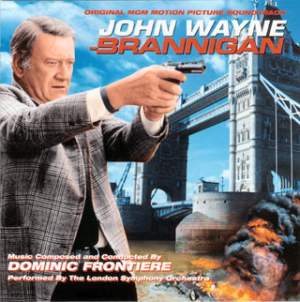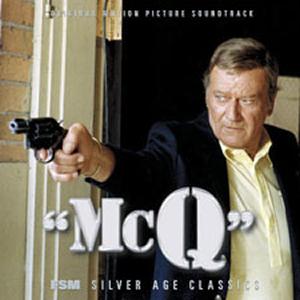You wait years for a jazz-funky orchestral score for a 1970's John Wayne detective movie, then two arrive at once. Here, as it seemed most sensible to review them together, is FMOTW's coverage of the near simultaneously released albums for a pair of John Wayne thrillers, the two modern day detective action movies he made in 1974-5: McQ with music by Elmer Bernstein and Brannigan, scored by Dominic Frontiere
Brannigan
Music composed and conducted by Dominic Frontiere
Performed by The London Symphony Orchestra
Available on La-La Land Records LLLCD 1012 ;
Running time: 41.47
La La Land Records 150 S. Glenoaks Blvd. #9252, Burbank, CA. 91502In the 1970's, having made the mistake of turning down the lead in Dirty Harry (1972), John Wayne made two post Dirty Harry crime thrillers; Brannigan (1975) and McQ (1974). Neither were anything special, though the latter had the classier credits, being directed by John (The Magnificent Seven, The Great Escape) Sturges, with a score by Elmer Bernstein, while Brannigan was directed with Douglas (Theatre of Blood, Zulu Dawn) Hickox with music by Dominic Frontiere.
Far less well known than Bernstein, Frontiere had won Wayne's respect with his scores for Chisum (1970) and The Train Robbers (1973), and was according to the informative booklet which comes with this release simply trusted to get on with providing whatever music he felt the film needed. A rare and enviable circumstance for a film composer.
The result, one of those typically catchy big-band / orchestral swinging 1970's themes, marred in part by a necessity to be funky and incorporate that incredibly irritating – for totally out of place – funky vibe which even at the time made everything from disaster movies to cop dramas feel irretrievably lightweight, and now makes them seem garnished with mouldy old cheese. It's a style with roots in the 1960's / early 1970's – from the Bond movies to Bullitt (1968) and Dirty Harry, the latter pair of which brought the American detective incarnation of the sound to full maturity with scores by Lalo Schifrin, masterfully recreated recently on the album "Jazz in Film" which I reviewed last month.
Frontiere's theme is bold and memorable as many others in the genre. It's just a shame it came a couple of years before John Williams put full scale symphonic scoring firmly back on the Hollywood map with Star Wars, and the very same London Symphony Orchestra which sounds so fine here. Both performances and sound quality are excellent. As for the score itself, it combines elements of the theme with suspense and action writing typical of the period. There's a formal elegance to string writing of "The Kidnap" which bodes well while percussion is used effectively to generate unease in "Ransom – Part One", even if many of the devices Frontiere employs here on in now sound overly familiar from hundreds of episodes of 1970's TV cop shows; "Ransom – Part Two" blends rock guitar and beats with orchestral writing the same sort of inventiveness Stu Philips brought to many projects. "Ransom – Part Four" begins with the kind of descending motif familiar from many Barry Grey scores for Thunderbirds and the like, before becoming a routine if polished exercise in genre action-suspense. More Barry Grey-like material dominates "Shotgun", while "Stampede Along The Thames" sublimates the main theme into a propulsive big band workout with just a dash of funk which proves to be tremendous fun and a real highlight of the album.
"Bugging Around" delivers a frenetic, dynamically orchestrated set-piece filled with ingenious touches of percussion and rousing suspense which makes one wish more of the score could have offered this level of involvement. The finale, "Here Comes The Jag" brings many of the elements of the score together and offers a rousing percussive workout, which bar a short end title reprising the main theme, concludes a score, the best parts of which make for most enjoyable listening, but which contains too much generic suspense material to be truly outstanding.
This is a nicely presented disc with production values rather higher than some past issues from La-La Land Records.
Gary Dalkin
3
McQ
Music composed and conducted by Elmer Bernstein
Available on FDMCD Vol. 6, No. 19 ;
Running time: 49.26
Avaliable from: Film Score , 8503 Washington Boulevard, Culver City, CA90232; Tel: 1-888-345-6335; overseas: 310-253-9595; fax: 310-253-9588 e-mail: Info@filmscoremonthly.comPre-dating Brannigan by a year, McQ is cut from very similar cloth, with a comparable mixture of orchestral jazz writing with elements of funk and typical 1970's suspense underscore. The action writing is a little more intense, the jazz a little more swaggering, the best passages just a touch more pungent.
Bernstein was after all the composer who gave the world the jazz influenced scores The Man With The Golden Arm (1955) and Walk On The Wild Side (1962), music from both of which is featured on the "Jazz in Film" album mentioned above. Bernstein also had a long and fruitful collaboration with John Wayne. Their first film together was The Comacheros (1961), which was followed by The Sons Of Katie Elder (1965), Cast A Giant Shadow (1966), True Grit (1969), Big Jake (1971), Cahill U.S. Marshal (1973), and finally Wayne's last film, The Shootists (1976). None of those westerns though found Bernstein penning a cocktail lounge jazz theme such as "Garden Party", a cue which ranges from jazzy introspection to blandly MOR style love theme writing of the sort once found everywhere from Henry Mancini and Michel Legrand to John Williams.
"Ginger/Rosey" offers a brash funky workout complete with wah-wah guitar and fromage rich Hammond organ and its only Bernstein's great skill as a composer which prevents the whole from degenerating into typical unmusical rock. It does though, with its swaggering horns, perhaps point the way towards Rocky (1976). The wah-wah cheddar continues into the intro of "Sal/Mrya", which then takes an unexpected turn into a delicate and tender love theme which shows Bernstein's true talents as a composer.
As the album unfolds the scoring, for all its inventive detail, does become rather repetitive, big-band struts suddenly switching to funky riffing, the two elements coming together and fusing with a brass solo or two, as in the tremendously dynamic "Dirty Laundry", or else surrendering to orchestral string stings in the likes of the following "Fooled". Infectious as much of this is, and as finally crafted as the arrangements are, all but the most dedicated listener may find interest flagging. It's not that what Bernstein does here isn't good within terms of the genre and format, but that the monothematic nature of the standout cues does strain the patience. Elsewhere more low key writing such as "Lies" establishes an effectively dreamlike atmosphere, a rarity among material more inclined to unsettle with insinuating rhythms and sly percussion before busting back into action once more for the thrilling and highly complex final set piece, "Toms/Sea Chase". Sound and presentation are first rate.
As scores and albums McQ and Brannigan show the similarities rather than the differences between the two composer's styles, for both were writing genre scores for comparable films with the same star in the same time period. The chances are that anyone who likes one will like the other roughly as much. McQ is a somewhat harder edged and more punchy, but also more repetitive. Both contain several very strong cues, and equally offer other material which probably won't find itself replayed so often.
A shame that the two discs are on different labels, as the best way of presenting this music would probably have been a double feature album which would only have had to sacrifice around 11-12 minutes of music to feature the best of both soundtracks on a single CD. As it is, it is very difficult to recommend one over the other, though my personal preference is for the slightly greater variety offered by Dominic Frontiere's Brannigan.
Gary Dalkin
3
Return to Index

